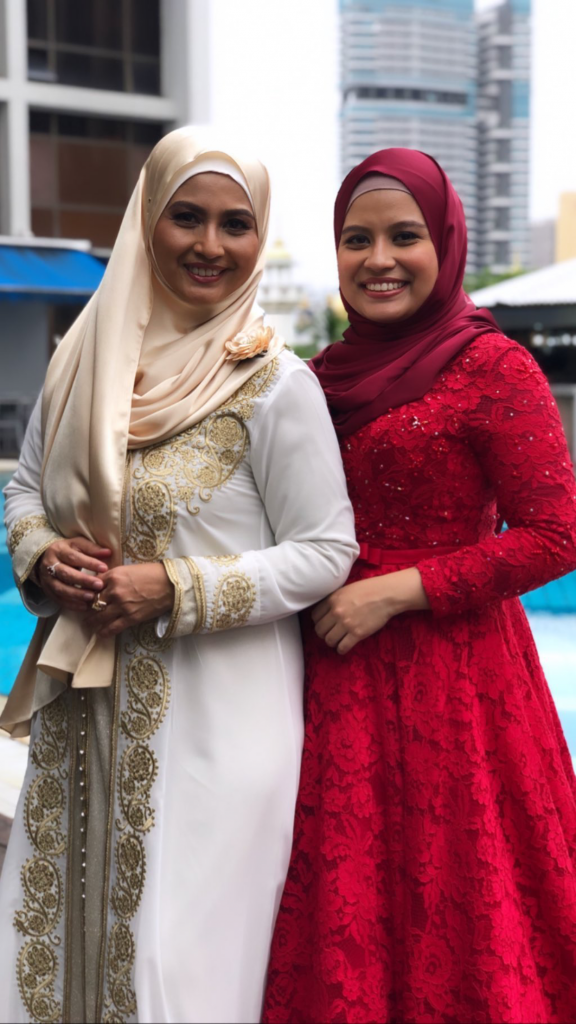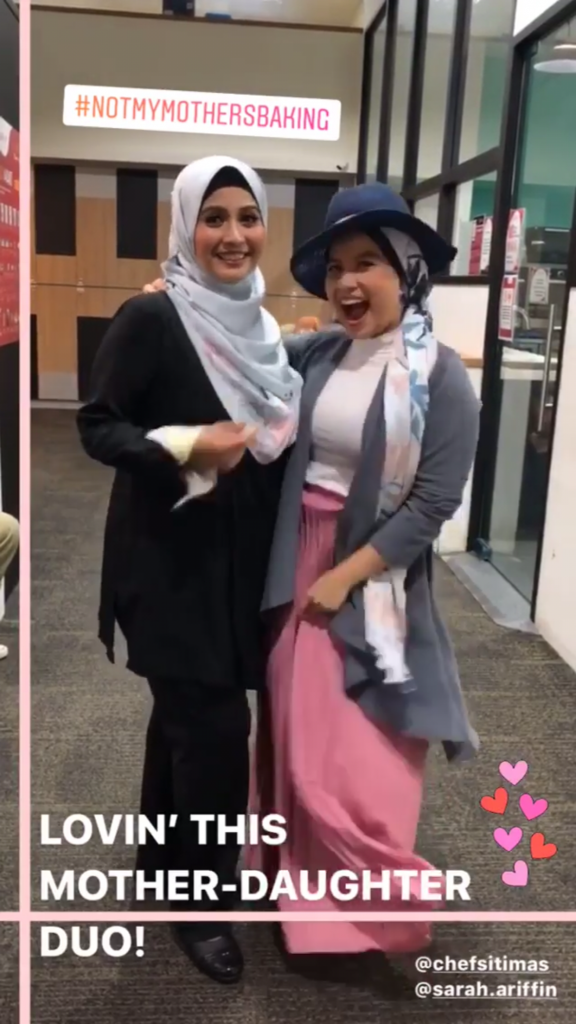Not My Mother’s Baking is a rare film that presents the faultlines in inter-ethnic and inter-faith Singapore in a point-blank yet light-hearted way. We have the opportunity to interview director Remi M Sali, a Ngee Ann Poly graduate and Chef Sarah Ariffin, who plays the female lead in the film. Here’s what they have to say about the controversial portrayals in their film.
Question: What inspired you to come up with the plot of Not My Mother’s Baking?
Remi: It first started with my friendship with Chef Siti Mastura. We had initially approached her for a webisode series and afterwards got to know her daughter – Chef Sarah. From there, we learned about their issues in getting media exposure just because they wear the hijab. To me, I felt pretty indignant and I personally felt that the media should only judge the talent according to what they can contribute to the industry and not what they wear … It became much clearer for us that there’s a lot more to be told so that’s when we decided to produce a movie to really showcase both chefs’ talents and to also give a bit more insight to the life of a mother-daughter celebrity duo.
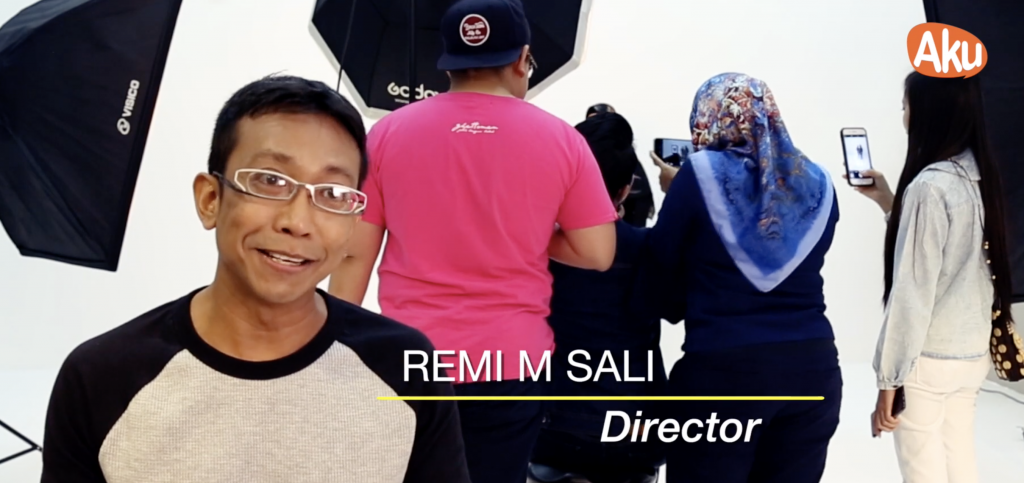
Screenshot from akupunya.tv
Question: Remi brought up that you and Chef Siti faced issues in getting media exposure as you both wear the hijab. Could you explain more about the challenges?
Sarah: I think the person who bore the brunt of it most was my mum. She was in a popular TV series called Vanilla, which I know the older generation is more familiar with. Chef Siti was quite an icon on the TV show with the signature flower in her hair and all. However, after she decided to don the hijab, she received less and less air time on TV.
I had a similar experience. I started off in Malaysia and I decided to don the hijab after two years in showbiz. A lot of people at the time thought that it was a foolish move because I was ‘up and coming’ and when I started wearing the hijab, the number of offers that I received started to dwindle.
Photo credit: Not My Mother’s Baking Official Instagram
For me and my mother, it’s beyond looking good in showbiz – we wanted to impart our baking skills. I watch a lot of baking videos on YouTube and Instagram and sometimes feel that the technique used is just not right. So I took it upon myself to ensure that I do it properly and that I was going to teach what I’ve learnt from being professionally trained in the kitchen because I want people at home to be able to bake well. That’s what inspired me to start my YouTube channel and I think that was also where Remi got his inspiration to add the baking vlogs in Not My Mother’s Baking where I try to differentiate myself from Chef Siti.
It was difficult because we didn’t have a media outlet. In fact, we reached out to the local TV stations and they were simply not interested. That’s when we knew that if we were going to do the movie, we had to do it with our own resources – we’re going to do it our way and show them that even with the hijab, we can still get people to talk about the movie because the hijab is essentially just a piece of cloth and nothing under that changes. I’m still the same pastry chef – Chef Sarah – with and without the hijab.
Even in the movie, one of my lines was: “Obviously you don’t know me well enough to know that I can curse and swear when I’m angry with the hijab on.” So this was a reminder to everyone that even with the hijab, I’m still the same person.
Question: What were the challenges you faced during production and how did you overcome them?
Remi: One of the challenges we had was with Sarah’s schedule. (laughter)
Sarah: My schedule?
Remi: Yes, your schedule! That was our very first challenge, actually. (more laughter) Because when we first discussed what exactly we were going to do, she (Sarah) wasn’t dating. When we finally came to a decision to make a movie, she suddenly came in and said “Ta-da! Here’s my boyfriend”, and so we had to figure out how to settle this because not only would she have to juggle between her work and the movie, she also has her real love interest in the equation, so that was a challenge.
Sarah: (laughs) Well, it’s not actually true that the challenge was my love interest. In the movie, there is a character called Imran, who is the perfect Malay guy. That character was actually based on a real person in my life at the time whom my mother really wanted me to be with. It was only after two years that we decided to go out while my mother was overseas and we finally decided to get together just before the filming of the movie. So, in a way, it helped inspire many things and helped my acting in the movie because it felt very ‘real’, and other than that, because I was working full-time, we only had the weekends to film my scenes. The other characters like Vincent Tee who are full-time actors could easily afford to do filmings on a weekday but not for me because I’m working office hours so this made the scheduling difficult. The movie was also brought forward a few weeks because of Zack Zainal’s schedule too – he had to fly in from Dubai to Singapore for the movie. I think we worked the schedule out pretty well to pull a movie together in a span of 2 months.
Another challenge would be my lack of acting experience. Remi wanted me to be super manja with my mum but I’m not that manja girl with my mother. We are super tough – I’ll give you an example – she will call me and say “Have you checked my business file?” and then I will joke and reply: “Oh, why did you not ask if I have eaten first?” – you know – like a normal mother would. (laughter) She in fact treats me like a business partner. So because of this it was a bit difficult when Remi asked that we act like the typical mother and daughter. I cannot blame Remi because although the typical mother and daughter are more manja, we are simply not like that.
Question: There is a pork-eating Malay character in the movie, and a lot of people would think that it might be too sensitive a topic. What were you trying to convey by having such a character in the movie?
Remi: We did take a lot of risks to introduce such a character in the movie. We wanted to actually push the boundaries because we felt that this was a once-in-a-lifetime chance, not only because we had the mother and daughter chefs on board but also Zack Zainal and his son who flew all the way down from Dubai to Singapore. In addition, we also had veteran talents as well so all these made the perfect combo for us to push the script to another level.
And with Matin, the pork-eating Malay character, we actually wanted him to be a challenging one that made Malay Muslims pause and think. We have already touched on the hijab issue and showcased the ultimate scene of the pork seller’s son becoming a Muslim, then we also wanted to acknowledge the fact that there are some ‘multi-Muslims’ living among us. I’m referring to Muslims of different levels of practice and understanding of the faith. For instance, the Muslim reverts in comparison with the born Muslims, the practising Muslim and the non-practising ones (but still identify as Muslims) and even those who are regarded as Muslims solely by association (like race – Malay, or nationality – Brunei).
Why can’t we showcase it on the big screen? I personally felt very grateful that a lot from the audience came up to me to express their concern about the character. I felt very touched because they were more worried about how people would react to me and how that could affect my integrity rather than stating that they found the whole thing offensive. I also felt very relieved that we received a lot of positivity for this character – people took it as a discussion point and I think Chef Sarah also had a lot of laughs with his character as well.
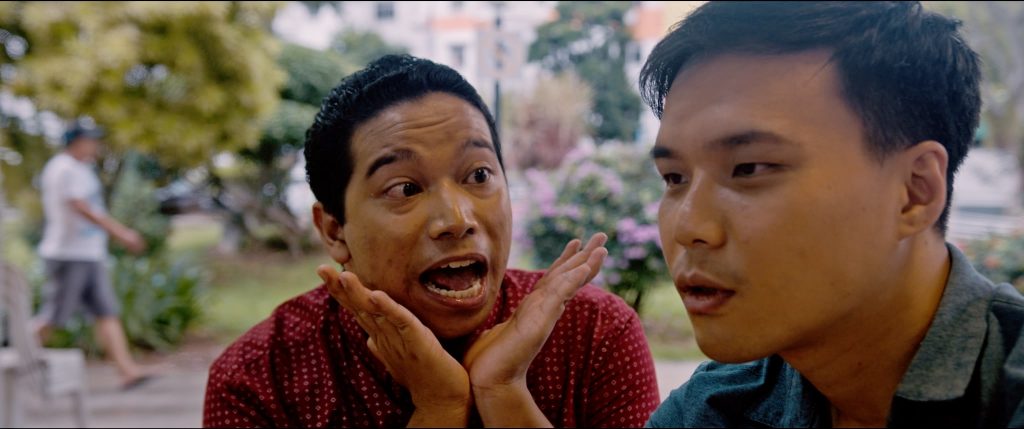
Photo credit: Not My Mother’s Baking Official Website
Sarah: (laughs) My mum didn’t have the same reaction. She was very upset about the whole pork-eating character so I told her: “It’s not like they asked you to eat pork. Relax lah.”
She then told me that she was worried that the audience would associate her with supporting the act of Matin eating pork and so I explained to her that her generation is more conservative. But for our generation, it is so common for people to eat at non-Halal restaurants or even blatantly eating pork. I mean, we all know friends who do that so it isn’t something taboo for me because I’m in the food industry and am surrounded by this every single day. But for her it’s like “Wow, this makes the story so haram – how could we show it like this?”
So she was very upset over that but I think she then came to realise that what we need to have is a conversation that not all Malays are Muslims, and not all Muslims are Malay. So the scene where Matin says “Religion and race are different. What I put in my mouth is between me and God” is important.
A lot of my Chinese friends have asked: “Eh, how come my Malay friend can eat pork but why can’t you?” I’m sure all of us Malay Muslims have gotten this question at least once from friends. This movie really helps explain to them in a very subtle way without offending any particular group while also being funny at the same time. I personally thought that it was hilarious that Matin was so blunt and so open about his love for pork.
Remi: I’d like to add to that. As the director of the film, we took great pains to not show that he is too near to the stall – that’s one. And another part is mainly his dialogue – we don’t even show him chewing the meat or something like that. It’s just the words, you know? In the movie, when he described the pork-eating in front of Chef Sarah as delicious, he told her that it was a Chinese friend who actually said that. In another way it was him trying to disassociate himself and had a safe cover. And there was also one scene when Matin was nearly touching the pork and then we had two makciks coming around and he immediately backed off. So what we are trying to say is that he’s not actually going to openly eat in front of others so that’s why he tapaus to eat in his own privacy.
Question: What is one takeaway that you would like people to get from watching Not My Mother’s Baking?
Remi: Discuss. If there’s one word thing that I would want people to do is to discuss. There are a lot of points that we would love for people to talk about – even the circumcision part. There’s a scene showing Edwin going for circumcision, and then a viewer brought up that going for circumcision is no longer a must for men who want to convert to Islam. We were actually told that by the people who watched the movie.
Sarah: For me, there are three parts that I would like people to take away with them. Firstly, my relationship with my mum – how it’s like to live in the shadow of a celebrity family member. When you grow up in that kind of environment, it’s very easy to get caught up with who they are and you forget your identity, you forget yourself – so it is important to learn how not to be afraid to express your identity as a person because you still matter. Your family member could be the famous one but you are also your own self and nobody can take that away from you.
The second would be the whole pork issue – I like how the Chinese family talks about it in the movie. They said when Edwin (the male lead) was younger, the Malay families did not let their kids play with him because of the nature of their family business (they sell pork) … so there’s really a lot of things that people are afraid to talk about finally being out in the open.
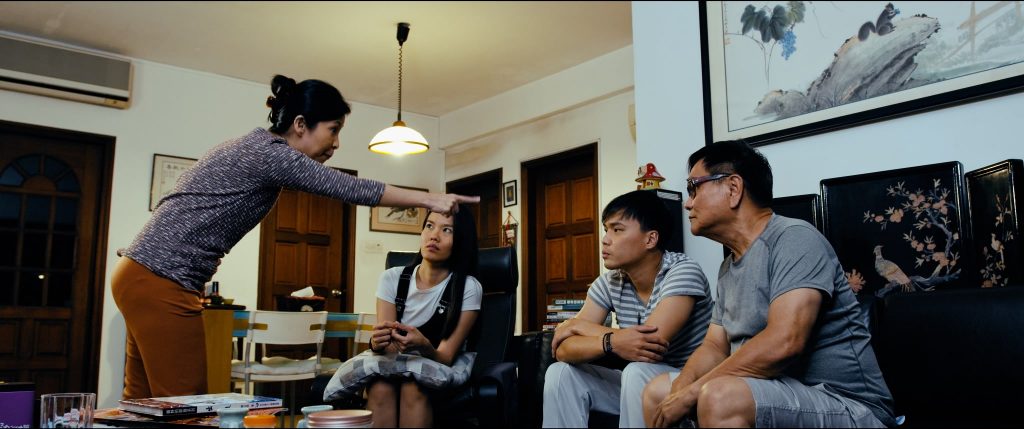
Photo credit: Not My Mother’s Baking Official Website
The third part would be the conversion. My Chinese friends could finally see the conversion process because many of them have so many questions like “Does that mean that when you potong (circumcised) already, a big part of you will be missing?” or “Where do you go to potong?”
In the movie, the conversion process shown is very complete – even down to the lafaz shahadah – so you see that it takes place in Darul Arqam and just the overall process was beautifully shot by the team.
On the flipside, the movie also shows what it’s like for the Chinese family to go through when their child converts to Islam. For example … Edwin’s mum refuses to hug her son after he converts because she smells of pork … These are the three key things that are very close to heart.
In addition, there was also the freedom to act – Remi never gave us a script and he told us to just say what we ourselves would say in the moment or situation so in the movie, there were scenes that were never rehearsed and my reactions in those scenes were very organic. This freedom helped bring my character out as well.
Remi: I would like to add another point – we actually had an international audience in mind when we did the movie. But then while watching the movie with an audience, I always look forward to seeing which parts of the movie works for the Chinese viewers and which parts work for the Malay viewers and that’s the part which I personally feel is very exhilarating – I get a bit of kick and get addicted to the feeling of trying to see which points of the movie the Malays or the Chinese audience will laugh at and this is why I feel Not My Mother’s Baking is unique.
See our review of the movie here.
Not My Mother’s Baking will be organising a Facebook Live Q&A session – From Small Team to Big Screen – on Saturday, Jan 23 at 8 pm.


